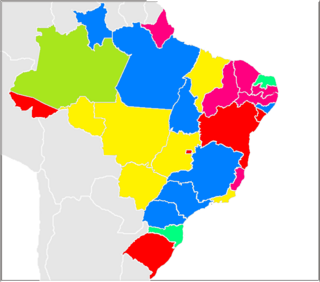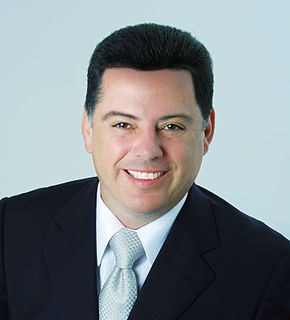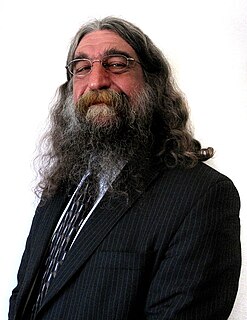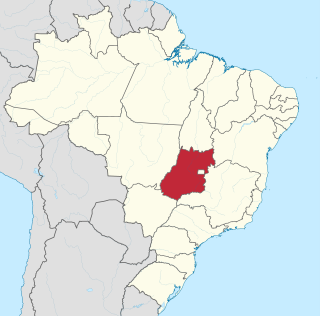
The Workers' Party is a democratic socialist political party in Brazil. Launched in 1980, it is one of the largest movements of Latin America. PT governed at the federal level in a coalition government with several other parties from 1 January 2003 to 31 August 2016. After the 2002 parliamentary election, PT became the largest party in the Chamber of Deputies and the largest in the Federal Senate for the first time ever. With the highest approval rating in the history of the country, President Luiz Inácio Lula da Silva is PT's most prominent member. His successor Dilma Rousseff, also a member of PT, took office on 1 January 2011.
The Brazilian Social Democracy Party, also known as the Brazilian Social Democratic Party or the Party of Brazilian Social Democracy, is a centrist political party in Brazil. As the third largest party in the National Congress, the PSDB was the main opposition party against the left-wing Workers' Party (PT) administrations of Luiz Inácio Lula da Silva and Dilma Rousseff from 2003 to 2016.

The 2008 United States Senate elections were held November 4, 2008, with 35 of the 100 seats in the Senate being contested. Thirty-three seats were up for regular elections; the winners were eligible to serve six-year terms from January 3, 2009 to January 3, 2015, as members of Class 2. There were also two special elections, the winners of those seats would finish the terms that ended January 3, 2013.

The Brazilian Socialist Party is a political party in Brazil. It was founded in 1947, before being abolished by the military regime in 1965 and re-organised in 1985 with the re-democratisation of Brazil. It elected six Governors in 2010, becoming the second largest party in number of state governments, behind only PSDB. In addition to that, it won 34 seats in the Chamber of Deputies and three seats in the Senate, besides having been a member of the For Brazil to Keep on Changing coalition, which elected Dilma Rousseff as President of Brazil.
The Democrats is a political party in Brazil. It was founded in 1985 under the name of Liberal Front Party from a dissidence of the defunct PDS, successor to the ARENA, the official party during the military dictatorship of 1964–1985. It changed to its current name in 2007. The original name reflected the party's support of free market policies, rather than the identification with international liberal parties. Instead, the party affiliated itself to the international federations of Christian democratic (CDI) and conservative parties (IDU). The Democrats' identification number is 25 and its colors are green, blue, and white.

The 2008 United States Senate election in Georgia took place on November 4, 2008. The run off election took place on December 2, 2008. Republican Senator Saxby Chambliss, first elected in 2002, sought re-election to his position as a United States Senator from Georgia. He was challenged by Democratic nominee Jim Martin and Libertarian nominee Allen Buckley. After a runoff election on December 2, Chambliss was elected.

Orestes Quércia was a Brazilian politician. He was the 28th governor of São Paulo State.

The first round of the Brazilian general election of 2010 was held on Sunday, October 3, 2010. The Presidency of the Republic, all 513 Chamber of Deputies seats and 54 out of 81 Federal Senate seats were contested in this election, along with governorships and Legislative Assemblies of all 26 states and the Federal District. On October 31, a run-off was held for president and eight state governorships that did not reach 50% plus one of the valid votes cast in the first round.

The 2010 Connecticut gubernatorial election took place on November 2, 2010, to elect the 88th Governor of Connecticut. Incumbent Governor Jodi Rell had announced in a press conference in Hartford on November 9, 2009, that she would not seek re-election in 2010. The sites Cook Political Report and CQ Politics both rated the election as a toss up.

General elections were held in Brazil on 4 October 1998, with a second round on 25 October. In the first round Fernando Henrique Cardoso was re-elected President and the governorships of 14 states were elected, in addition to all seats in the Chamber of Deputies and Legislative Assemblies, and one third of the seats in the Federal Senate. In the second round the governorships of 12 states and the Federal District were defined. This election was marked by the use of voting machines for the first time ever. They would have been used in all municipalities two years later, in the 2000 local elections.

The Brazilian gubernatorial elections, 2010 will be held on Sunday, October 3, as part of the country's general election. In these elections, all 26 Brazilian states and the Federal District governorships will be up for election. If none of the candidates receives more than a half of the valid votes, a run-off will be held on October 24, 2010. According to the Federal Constitution, Governors are elected directly to a four-year term, with a limit of two terms. Eleven governors are prohibited from seeking re-election.

The 2010 United States Senate special election in West Virginia was held on November 2, 2010. Incumbent Democratic U.S. Senator Robert C. Byrd died in office on June 28, 2010. Democratic Governor Joe Manchin appointed Carte Goodwin to temporarily fill the vacancy. Goodwin pledged to not run for election to the seat in exchange for the appointment. Governor Manchin won the open seat and served out the remainder of Byrd's elected term, which ended on January 3, 2013.

General elections were held in Brazil on 1 October 2006 to elect all seats in the Chamber of Deputies, one-third of the Federal Senate, and members of the Legislative Assemblies of the 26 states and the Federal District. As no candidate for president received over 50% of the vote, a second round run-off was held on 29 October between incumbent Luiz Inácio Lula da Silva and his challenger, Geraldo Alckmin. A second round was also required in 10 states where no candidate for governor received a majority. Lula won the second round with over 60% of the valid votes and secured a new four-year term.

Marconi Ferreira Perillo Júnior is a Brazilian politician, affiliate to the Brazilian Social Democracy Party (PSDB). He is the current governor of the state of Goiás and he is on his third mandate.

General elections were held in Brazil on 3 October 1994. The presidential elections were won by Fernando Henrique Cardoso of the Brazilian Social Democracy Party, who received 54.3% of the vote. Cardoso won the election by a margin of 27.3%, the largest in Brazilian history to date, and the first of his two landslide victories. The Brazilian Democratic Movement Party remained the largest party in the Chamber of Deputies and the Senate.

The 2014 Rhode Island gubernatorial election took place on November 4, 2014, to elect the Governor of Rhode Island, concurrently with the election of Rhode Island's Class II U.S. Senate seat, as well as other elections to the United States Senate in other states and elections to the United States House of Representatives and various state and local elections.

The Goiânia mayoral election of 2012 was held on 7 October as part of the municipal elections in Brazil. Then incumbent mayor, Paulo Garcia, elected as the running mate of Iris Rezende in the previous election, ran against seven other candidates and was re-elected with more than 57% of the valid votes. On the same date, voters also chose their 35 representatives for the Municipal Chamber. The elected mayor, deputy-mayor and aldermen will serve from 1 January 2013 until 31 December 2016, when their terms will officially expire.

Alexandre Baldy de Sant'Anna Braga, commonly known as Alexandre Baldy, is a Brazilian politician filiated to the Progressive Party (PP). Currently, is discharged from the office as Federal Deputy from Goiás to take office as Minister of Cities. Between 2011 and 2013, was State Secretary of Industry and Trading of Goiás, nominated by governor Marconi Perillo.

The 2018 Goiás gubernatorial election was held in October 2018, and elected the Governor and Vice Governor of Goiás and 41 State Deputies.
Gubernatorial elections were held in Brazil on 5 October 2014 alongside nationwide general elections, with runoff elections held in several states on 26 October.





















